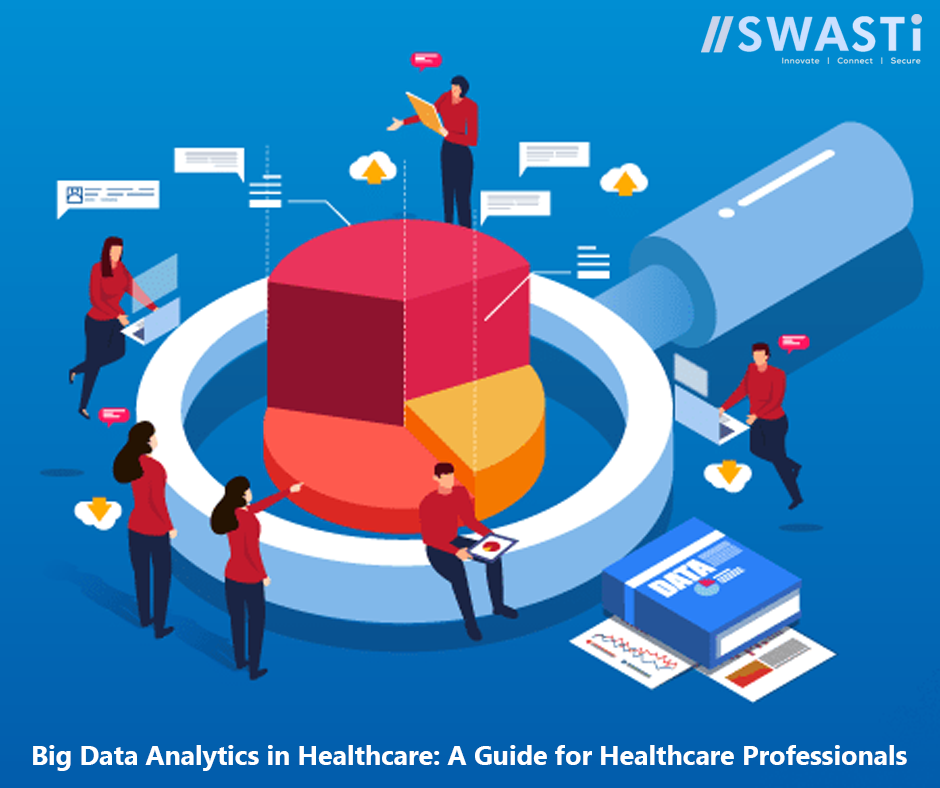
Big Data Analytics in Healthcare: A Guide for Healthcare Professionals

Guide for Healthcare Professionals - How Big Data Analytics is Revolutionizing Healthcare
The field of healthcare has witnessed a revolutionary transformation with the advent of big data analytics. The massive amounts of healthcare data generated daily hold great potential for improving patient outcomes, enhancing operational efficiency, and facilitating evidence-based decision-making.
This guide aims to provide healthcare professionals with an in-depth understanding of big data analytics and its applications in healthcare.
What is Big Data Analytics?
Big data analytics refers to the process of examining large volumes of complex and diverse datasets to uncover patterns, correlations, and insights that can inform decision-making. It involves collecting, storing, managing, and analyzing vast amounts of structured and unstructured data from various sources, such as electronic health records (EHRs), medical devices, wearables, social media, and research studies.
The Four V's of Big Data Analytics:
To grasp the essence of big data analytics, it is crucial to understand its four defining characteristics, often referred to as the four V's:
a) Volume: Healthcare data is generated in enormous quantities. The volume of data includes patient records, clinical notes, medical imaging, genomics, and real-time sensor data. Analyzing such vast amounts of data requires scalable and efficient processing techniques.
b) Velocity: Healthcare data is produced at an unprecedented speed. Continuous streams of data from monitoring devices, social media, and wearable technologies provide real-time insights that can influence patient care and outcomes.
c) Variety: Healthcare data comes in various forms, including structured data (e.g., EHRs) and unstructured data (e.g., clinical notes, images, and social media posts). It also encompasses data from different sources, such as hospitals, clinics, pharmacies, and research studies.
d) Veracity: Healthcare data can be complex, incomplete, and inconsistent. Ensuring data accuracy, quality, and reliability is crucial to generate meaningful insights and avoid erroneous conclusions.
Applications of Big Data Analytics in Healthcare:
a) Predictive Analytics: By applying advanced algorithms to historical and real-time data, big data analytics enables the prediction of disease progression, patient readmission rates, medication adherence, and the likelihood of adverse events. This empowers healthcare professionals to proactively intervene, personalize treatment plans, and allocate resources more effectively.
b) Clinical Decision Support: Big data analytics tools can analyze vast amounts of medical literature, clinical guidelines, and patient data to provide evidence-based recommendations at the point of care. This assists healthcare professionals in making informed decisions, reducing diagnostic errors, and improving treatment outcomes.
c) Population Health Management: Big data analytics allows healthcare professionals to analyze population-level data to identify disease trends, risk factors, and preventive measures. It facilitates the development and implementation of targeted interventions to improve population health, manage chronic diseases, and reduce healthcare costs.
d) Drug Discovery and Development: Analyzing large datasets, including genomics, proteomics, and drug interactions, enables researchers to identify new drug targets, predict drug efficacy, and develop personalized therapies. Big data analytics expedites the drug discovery process, reduces costs, and enhances patient safety.
e) Operational Efficiency and Resource Optimization: Healthcare organizations can leverage big data analytics to optimize resource allocation, streamline workflows, and improve operational efficiency. It aids in predicting patient demand, optimizing staff schedules, and identifying bottlenecks in care delivery.
Challenges and Considerations:
Despite the immense potential of big data analytics in healthcare, several challenges need to be addressed:
a) Data Security and Privacy: Healthcare data is sensitive and subject to stringent privacy regulations. Protecting patient privacy, ensuring data security, and complying with regulations such as HIPAA (Health Insurance Portability and Accountability Act) are critical considerations.
b) Data Integration and Interoperability: Healthcare data is often scattered across multiple systems and formats, hindering seamless data integration and interoperability. Establishing data standards, interoperable systems, and robust data governance frameworks are essential for effective big data analytics.
c) Data Quality and Reliability: Big data analytics heavily relies on accurate and reliable data. Data quality issues, such as missing or erroneous data, can lead to biased insights and erroneous conclusions. Ensuring data integrity and implementing data validation processes are crucial steps.
d) Skills and Expertise: Healthcare professionals need to acquire the necessary skills and knowledge to leverage big data analytics effectively. Training programs, continuing education, and collaboration with data scientists and analysts are essential for successful implementation.
Ethical Considerations:
As big data analytics continues to expand in healthcare, ethical considerations become increasingly important. Healthcare professionals must ensure:
a) Informed Consent: Patients must be adequately informed about the data collection, storage, and analysis processes and provide their informed consent before their data is utilized.
b) Data Anonymization and De-identification: Personal identifiable information should be carefully protected through anonymization and de-identification techniques to preserve patient privacy.
c) Data Ownership and Governance: Clear policies and guidelines should be established to determine data ownership, access rights, and data governance to maintain transparency and accountability.

